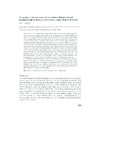Promoting multiculturalism and intercultural dialogue through instituitions and initiatives of civil society organizations in Botswana

View/
Date
2010Author
Lubinda, J.
Publisher
Routledge (Taylor and francis), www.routledge.comType
Published ArticleMetadata
Show full item recordAbstract
Botswana is a multilingual and a multi-ethnic nation that has had a thriving multi-party democracy, peace, and stability since independence, in 1966. Despite the superficial impression that a casual observer may have of a socalled mono-ethnic and monocultural society, Botswana is in fact home to more than 30 tribes with diverse cultures. Over the past four decades, it has scored many successes in education, health infrastructure, and the economy in general. There is one area, however, where it still needs to make much progress, namely in the governance of cultural diversity. For many years after independence, official discourse has been in favor of a culturally and lingusistically homogenous society. This was the legacy of the colonial administration that aimed at promoting only the culture and the cultural interests of the Setswana-speaking tribes. In recent years, however, the political and administrative leaderrship has begun to embrace diversity and multiculturalism, as can be determined from official pronouncements and participation in social events that celebrate cultural and liguistic diversity. The article attempts to show how attitudes have evolved in the course of time and who has been active in advocating for recognition of minority ethic groups and their rights in matters of representation in the House of Chiefs, language use in education, collective land rights, etc. It shows the role of civil society organizations and cultural associations as well as that of the University of Botswana in agitation for equality.
